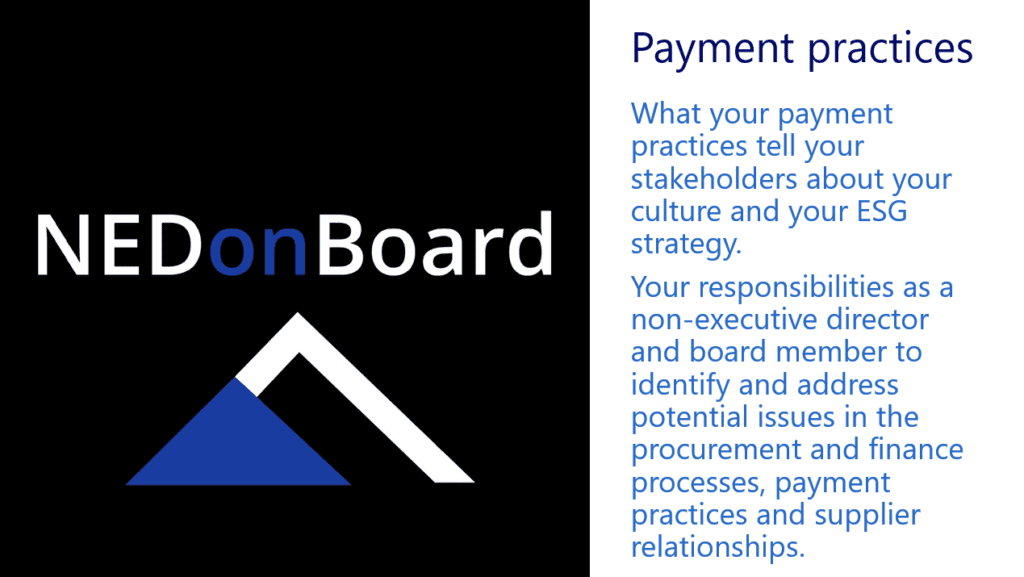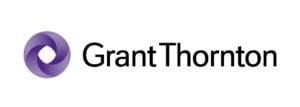Written by Elise Perraud, NEDonBoard COO
What your payment practices tell your stakeholders about your culture and your ESG strategy. Your responsibilities as a non-executive director and board member to identify and address potential issues in the procurement and finance processes, payment practices and supplier relationships.
Companies’ payment practices came into the spotlight after the collapse of Carillion. The construction company used its dominant position to impose late payments and unreasonable payment terms to its suppliers to shore up its failing financial position. It did not save Carillion from liquidation and had consequences on companies that made up its supply chain (related posts: Key Learnings from Carillion Collapse, Carillion’s Collapse: Lessons Learned).
Late payment practices have severe implications for the economy and its growth because they harm cashflows and hamper investments. They primarily impact small businesses.
At a time of increased pressure to embrace the ESG framework and engage effectively with stakeholders, payment practices should be on the board agenda.
The impact of the pandemic
The global pandemic has led to a deterioration of UK payment practices, with an increase in the average payment periods. A June 2020 study from the Federation of Small Business reported that 62% of small businesses have been subject to late or frozen payments in the wake of the COVID-19 outbreak.
The pandemic also prompted extensions in payment terms with more businesses offering customers longer to pay. But data shows that the longer receivables remain unpaid, the lower likelihood there is of collecting them, with a risk of non-payment, write-off, and revenues loss, with liquidity issues as a result.
The role of NEDs and boards
Boards of directors are ultimately responsible for the policies, practices and performance related to the payment of suppliers. It is important for NEDs and board members to take charge and ensure that reasonable payment practices are in place with the company on which board they serve. It is even more important for larger companies with a solid financial position to pay their suppliers to minimise potential liquidity issue within the supply chain.
- Section 172. Each company reports on how it discharges its duty under section 172, which places emphasis on stakeholders under The Companies (Miscellaneous Reporting) Regulations 2018.
- Corporate Governance Code. Stakeholder engagement is a core theme of the UK corporate Governance Code and of the Wates Corporate Governance Principles for Large Private Companies. For many organisations, effective engagement with suppliers is business critical.
- Corporate culture. Good payment practices are reflective of a culture that emphasises collaborative relationships with suppliers and business partners.
- Reputational risk. There is high reputational risk for companies practicing late payments or unreasonable payment terms. The transparency provided by the reporting regulations for large companies means that bad practices are exposed and can make the headlines.
- ESG. There is increased pressure for boards to embrace the ESG framework. Payment procedures are one of the many elements that fall within the ESG strategy of businesses. Good practices should be disclosed as part of the narrative in the annual reports (related post: ESG in the boardroom).
- Business opportunities. Good payment practices may represent business opportunities with suppliers favouring a business relationship in which they have certainty of payments.
Legislation
A legislation governs reporting requirements of large companies (The Reporting on Payment Practices and Performance Regulations 2017). Qualifying UK companies and limited liability partnerships are required to report on their practices, policies and performance relating to the payment of their suppliers. The reporting requirements provide increased transparency over payment practices and ensures that late payment practices are identified and publicly exposed.
Code of practice
NEDs and board members should consider the Prompt Payment Code, a voluntary code that sets standard for payment practices. Amendments to the Prompt Payment Code were announced in January 2021 with the main amendment implemented on 1st July 2021: businesses with less than 50 employees are to be paid within 30 days.
Next steps
Here are our recommendations:
- Ensure compliance with the legislation if you serve on the board of a qualifying company.
- Look at the Prompt Payment Code.
- Request a review of your Procurement and Finance processes at your next board meeting.
- Review your payment terms and instill positive changes if deemed necessary.
Related posts: Payment practices are part of your board ESG and culture agenda: expert interview; Measuring your ESG social impact with payment to small suppliers
NEDonBoard is a proud supporter of Good Business Pays.
To find out more about the ESG framework, effective stakeholder engagement, supply chain, sign up to become a member and attend one of our knowledge and authority events. You will gain access into our expert interviews and exclusive learning resources to achieve your NED career objectives.




